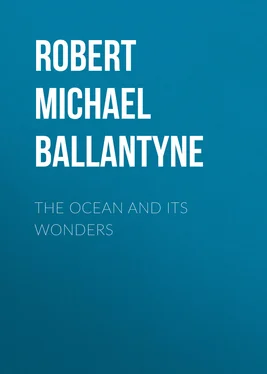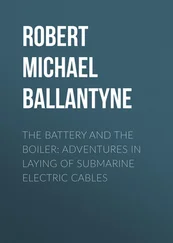Robert Michael Ballantyne - The Ocean and its Wonders
Здесь есть возможность читать онлайн «Robert Michael Ballantyne - The Ocean and its Wonders» — ознакомительный отрывок электронной книги совершенно бесплатно, а после прочтения отрывка купить полную версию. В некоторых случаях можно слушать аудио, скачать через торрент в формате fb2 и присутствует краткое содержание. Жанр: Детские приключения, literature_19, foreign_antique, foreign_prose, foreign_children, на английском языке. Описание произведения, (предисловие) а так же отзывы посетителей доступны на портале библиотеки ЛибКат.
- Название:The Ocean and its Wonders
- Автор:
- Жанр:
- Год:неизвестен
- ISBN:нет данных
- Рейтинг книги:4 / 5. Голосов: 1
-
Избранное:Добавить в избранное
- Отзывы:
-
Ваша оценка:
- 80
- 1
- 2
- 3
- 4
- 5
The Ocean and its Wonders: краткое содержание, описание и аннотация
Предлагаем к чтению аннотацию, описание, краткое содержание или предисловие (зависит от того, что написал сам автор книги «The Ocean and its Wonders»). Если вы не нашли необходимую информацию о книге — напишите в комментариях, мы постараемся отыскать её.
The Ocean and its Wonders — читать онлайн ознакомительный отрывок
Ниже представлен текст книги, разбитый по страницам. Система сохранения места последней прочитанной страницы, позволяет с удобством читать онлайн бесплатно книгу «The Ocean and its Wonders», без необходимости каждый раз заново искать на чём Вы остановились. Поставьте закладку, и сможете в любой момент перейти на страницу, на которой закончили чтение.
Интервал:
Закладка:
Scientific men are still disagreed on this point. They all, indeed, seem to hold the opinion that difference of temperature has to do with the origination of the stream; but while some, such as Captain Maury, hold that this is the chief cause, others, such as Professor Thompson, believe the trade-winds to be the most important agent in the matter. We venture to incline to the opinion that not only the Gulf Stream, but all the constant currents of the sea are due chiefly to difference of temperature and saltness . These conditions alter the specific gravity of the waters of the ocean in some places more than in others; hence the equilibrium is destroyed, and currents commence to flow as a natural result, seeking to restore that equilibrium. But as the disturbing agents are always at work, so the currents are of necessity constant. Other currents there are in the sea, but they are the result of winds and various local causes; they are therefore temporary and partial, while the great currents of the ocean are permanent, and are, comparatively, little affected by the winds. Every one knows that when a pot is put on the fire to boil, the water contained in it, as soon as it begins to get heated, commences to circulate. The heated water rises to the top, the cold descends. When heated more than that which has ascended, it in turn rises to the surface; and so there is a regular current established in the pot, which continues to flow as long as the heating process goes on. This same principle of temperature, then, is one of the causes of the Gulf Stream. The torrid zone is the furnace where the waters of the ocean are heated. But in this process of heating, evaporation goes on to a large extent; hence the waters become salter than those elsewhere. Here is another agent called into action. The hot salt waters of the torrid zone at once rush off to distribute their superabundant caloric and salt to the seas of the frigid zones; where the ice around the poles has kept the waters cold, and the absence of great heat, and, to a large extent, of evaporation, has kept them comparatively fresh. In fact, the waters of the sea require to be stirred, because numerous agents are at work day and night, from pole to pole, altering their specific gravity and deranging, so to speak, the mixture. This stirring is secured by the unalterable laws which the Creator has fixed for the carrying on of the processes of nature. The currents of the sea may be said to be the result of this process of stirring its waters.
It is curious and interesting to note the apparently insignificant instruments which God has seen fit to use in the carrying out of his plans. The smallest coral insect that builds its little cell in the southern seas exercises an influence in the production of the Gulf Stream. It has been said, with some degree of truth, that one such insect is capable of setting in motion the entire ocean! The coral insect has, in common with many other marine creatures, been gifted with the power of extracting from sea water the lime which it contains, in order to build its cell. The lime thus extracted leaves a minute particle of water necessarily destitute of that substance. Before that particle can be restored to its original condition of equality, every other particle of water in the ocean must part with a share of its superabundant lime! The thing must be done. That bereaved particle cannot rest without its lime. It forthwith commences to travel for the purpose of laying its brother-particles under contribution; and it travels far and wide—round and round the world. Myriads upon myriads of coral insects are perpetually engaged in thus robbing the sea water of its lime; shells are formed in a similar manner: so that our particle soon finds itself in company with innumerable other particles of water in a like destitute condition. It rises to the surface. Here the sun, as if to compensate it for the loss of its lime, bestows upon it an unusual amount of heat; and the surrounding particles, not to be outdone, make it almost unlimited presents of salt. Full to overflow with the gifts of its new companions, it hastens to bestow of its superabundance on less favoured particles; joins the great army of the ocean’s currents; enters, perchance, the Gulf of Mexico, where it is turned back, and hastens along with the Gulf Stream, with all its natural warmth of character, to ameliorate the climate of Great Britain and the western shores of Europe. Having accomplished this benevolent work, it passes on, with some of its heat and vigour still remaining, to the arctic seas—where it is finally robbed of all its heat and nearly all its salt, and frozen into an icicle—there for many a long day to exert a chilling influence on the waters and the atmosphere around it. Being melted at last by the hot sun of the short arctic summer, it hurries back with the cold currents of the north to the genial regions of the equator, in search of its lost caloric and salt, taking in a full cargo of lime, etcetera, as it passes the mouths of rivers. Arrived at its old starting-point, our wanderer receives once more heat and salt to the full, parts with its lime, and at once hastens off on a new voyage of usefulness—to give out of its superabundance in exchange for the superabundance of others: thus quietly teaching man the lesson that the true principles of commerce were carried out in the depths of the sea ages before he discovered them and carried them into practice on its surface.
Perchance another fate awaits this adventurous particle of water. Mayhap, before it reaches the cold regions of the north, it is evaporated into the clouds, and descends upon the earth in fresh and refreshing rain or dew. Having fertilised the fields, it flows back to its parent ocean, laden with a superabundant cargo of earthy substances, which it soon parts with in exchange for salt. And thus on it goes, round and round the world; down in the ocean’s depths, up in the cloudy sky, deep in the springs of earth; ever moving, ever active, never lost, and always fulfilling the end for which it was created.
All ocean currents are composed of water in one or other of the conditions just described;—the hot and salt waters of the equator, flowing north to be cooled and freshened; the cold and fresh waters of the north, flowing south to be heated and salted. The Gulf Stream is simply the stream of equatorial hot water that flows towards the pole through the Atlantic. Its fountain-head is the region of the equator, not the Gulf of Mexico; but it is carried, by the conformation of the land, into that gulf and deflected by it, and from it out into the ocean in the direction of Europe. This stream in the Atlantic is well defined, owing to the comparative narrowness of that sea.
The Gulf Stream, then, is like a river of oil in the ocean,—it preserves its distinctive character for more than three thousand miles. It flows towards the polar regions, and the waters of those regions flow in counter-currents towards the equator, because of the fixed law that water must seek its equilibrium as well as its level, thus keeping up a continuous circulation of the hot waters towards the north and the cold towards the south. There are similar currents in the Pacific, but they are neither so large nor so regular as those of the Atlantic, owing to the wide formation of the basin of the former sea.
The effect of the Gulf Stream on climate is very great. The dreary fur-trading establishment of York Factory, on the shores of Hudson’s Bay, is surrounded by a climate of the most rigorous character—the thermometer seldom rising up so high as zero during many months, and often ranging down so low as 50 degrees below zero, sometimes even lower, while the winter is seven or eight months long: the lakes and rivers are covered with ice upwards of six feet thick, and the salt sea itself is frozen. Yet this region lies in the same latitude with Scotland, York Factory being on the parallel of 57 degrees north, which passes close to Aberdeen! The difference in temperature between the two places is owing very much, if not entirely, to the influence of the Gulf Stream.
Читать дальшеИнтервал:
Закладка:
Похожие книги на «The Ocean and its Wonders»
Представляем Вашему вниманию похожие книги на «The Ocean and its Wonders» списком для выбора. Мы отобрали схожую по названию и смыслу литературу в надежде предоставить читателям больше вариантов отыскать новые, интересные, ещё непрочитанные произведения.
Обсуждение, отзывы о книге «The Ocean and its Wonders» и просто собственные мнения читателей. Оставьте ваши комментарии, напишите, что Вы думаете о произведении, его смысле или главных героях. Укажите что конкретно понравилось, а что нет, и почему Вы так считаете.












